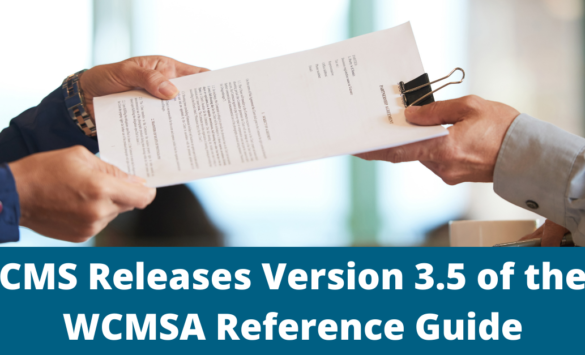The Centers for Medicare & Medicaid Services released Version 3.5 of the Workers’ Compensation Medicare Set Aside (WCMSA) Reference Guide on January 11, 2022 (version dated January 10th). The only notable update in this iteration relates to “Clarification… regarding the use of non-CMS-approved products to address future medical care (Section 4.3).” WCMSA Reference Guide, v3.5, Sec. 1.1.
By way of background, a “non-submit” is a prepared Medicare Set Aside (MSA) allocation which otherwise meets workload review thresholds[1] but isn’t submitted to CMS / Workers’ Compensation Review Contractor (WCRC) for review and approval. CMS has maintained that “[i]f the parties to a [workers’ compensation] settlement stipulate a WCMSA amount but do not receive CMS approval, then CMS is not bound by the set-aside amount stipulated by the parties, and it may refuse to pay for future medical expenses related to the… work-related injury, even if they would ordinarily have been covered by Medicare.” WCMSA Reference Guide, v3.5, Sec. 8.0. For several years now, CMS has indicated informally that they do not recognize non-submit MSAs.
The central feature to a non-submit MSA, other than foregoing CMS submission, is the utilization of an alternative costing methodology. The goal with employing an alternative methodology is often to eliminate items and services where they would otherwise have been included in a submitted MSA – thereby reducing the overall cost of the MSA. Non-submit MSAs typically reduce or eliminate the standard inclusion of certain items / services, employ weaning procedures relative to prescription drug regimens, and eliminate rote indications of some services – where individual differences in cases aren’t always considered by CMS, i.e., X PT visits annually, Y urine drug screens over the life of an individual, etc. Proponents of non-submit MSAs have asserted an evidence-based approach may, in some instances, allow for a more realistic projection of future treatment.
Another element to certain non-submit MSAs is a provision “indemnifying” or “insuring” the non-submit MSA in the event there are post-settlement issues with respect to the adequacy / sufficiency of the allocation or in the circumstance where CMS may deny treatment for work-related treatment otherwise covered by Medicare. This is not always a feature, but some vendors offer this as a component to their non-submit MSA.
In this most recent WCMSA Reference Guide, for the first time, CMS officially provided its policy position on non-submit MSAs. In full, Sec. 4.3, titled, “The Use of Non-CMS-Approved Products to Address Future Medical Care” reads as follows:
A number of industry products exist with the intent of indemnifying insurance carriers and CMS beneficiaries against future recovery for conditional payments made by CMS for settled injuries. Although not inclusive of all products covered under this section, these products are most commonly termed “evidence-based” or “non-submit.” 42 C.F.R. 411.46 specifically allows CMS to deny payment for treatment of work-related conditions if a settlement does not adequately protect the Medicare program’s interest. Unless a proposed amount is submitted, reviewed, and approved using the process described in this reference guide prior to settlement, CMS cannot be certain that the Medicare program’s interests are adequately protected. As such, CMS treats the WCMSA Reference Guide use of non-CMS-approved products as a potential attempt to shift financial burden by improperly giving reasonable recognition to both medical expenses and income replacement. As a matter of policy and practice, CMS will deny payment for medical services related to the WC injuries or illness requiring attestation of appropriate exhaustion equal to the total settlement less procurement costs before CMS will resume primary payment obligation for settled injuries or illnesses. This will result in the claimant needing to demonstrate complete exhaustion of the net settlement amount, rather than a CMS-approved WCMSA amount.
Breaking Down CMS’s Position
Essentially, CMS is taking the position that they view non-submit MSAs as a potential attempt to shift the financial burden to Medicare, apparently in contravention of 42 CFR 411.46(b)(2). CMS further indicates that in instances of a non-submit, they will deny post-settlement Medicare-covered expenses related to the underlying workers’ compensation injury until it can be shown, by way of attestation reporting, that the funds were exhausted equal to the amount of the settlement. This may result in beneficiaries exhausting their non-submit MSA and still facing denials for coverage from Medicare until they’ve exhausted their full settlement amount.
Importance of Post-Settlement Administration
It is yet to be seen how this policy will play out in practice. Regardless, it is critical to ensure proper administration of funds post-settlement – regardless of a submit or non-submit MSA. Just as CMS recommends submission of an MSA, they also “highly recommend” professional administration. See WCMSA Reference Guide, v3.5, Sec. 17.1. Given that CMS is placing emphasis on attestation reporting and oversight of non-submit spend, Ametros is here as a neutral party to help guide insurers, self-insureds, TPAs, MSA vendors, injured individuals, our members, and attorneys through the myriad of post-settlement issues potentially associated with this new policy.
Ametros will be following this policy very closely and will provide updates as warranted. In the interim, please contact us with any questions.
[1] Claimant is a Medicare beneficiary, and the total settlement amount is greater than $25,000; or they have a reasonable expectation of Medicare enrollment within 30 months of the settlement date and the anticipated total settlement amount for future medical expenses is expected to be greater than $250,000. See WCMSA Reference Guide, v3.5, Sec. 8.1.

